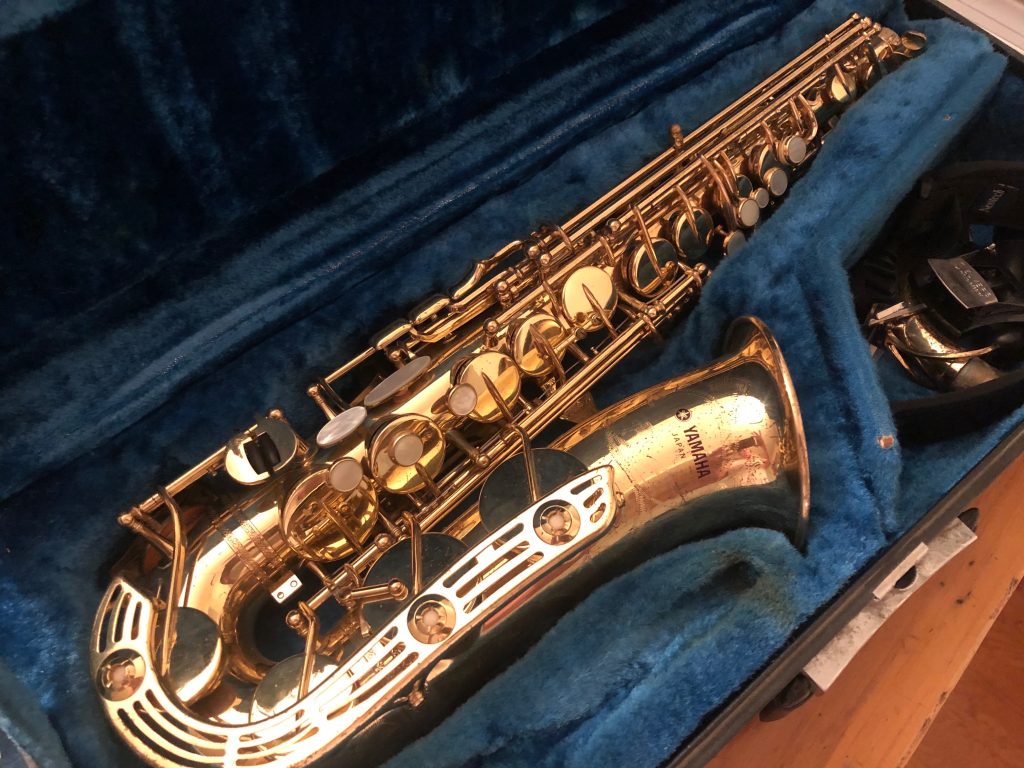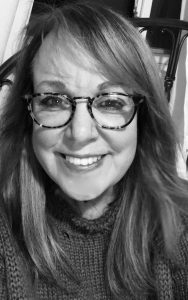
High-quality saxophone available, gently used, well cared for, and perfect for someone ready to make music.
by Beth Dolinar, contributing writer
My parents came home after I’d already gone to bed. I was in 8th grade and it was a school night.
“Come on down,” my father called upstairs.
I walked into the kitchen and there on the counter was a large, black rectangular case. At the top corner was the word “Yamaha.” I was pretty sure I knew what it was.
My parents at been to Volkwein’s, the Pittsburgh music store; as music teachers, they went there often to buy sheet music and drumsticks. I opened the box.
There it was, a shiny, golden alto saxophone, nestled in blue velvet like a constellation in the night sky.
“Take it for a spin,” my dad said, and so I pulled it out and felt the smooth gold skin. I wiggled the keys. I pulled out the black mouthpiece and looked at my dad.
“Reed?”
He handed me a box from his coat pocket. I took a reed, put it into my mouth to soak it, and speaking out of the corner of my mouth, I finally addressed this unimaginably beautiful surprise gift.
“Why? My old sax is fine,” I mumbled.
Once the reed was ready I put it on, sat down at the kitchen table and played some notes up and down the scale. The sound was deliciously warm and foggy. I was holding something I wasn’t ready for, and maybe didn’t deserve. Some parents buy their children expensive new bicycles or fishing poles, and some buy them jewelry. Mine bought me a professional-model Yamaha YAS-61.
It replaced the old, used student model I’d been playing since I’d switched from flute in 7th grade. I took to the sax right away, moved quickly from fifth seat in the band to first. The new saxophone might have been considered a gift for my effort, but it was likely more a case of musical parents nurturing a daughter’s potential.
I played that saxophone every day, through junior high and then high school and into college. For years, my dad drove me four towns away for private lessons. I enjoyed playing, but never considered music as a career. If my parents were disappointed they never let on.
I’m thinking of the saxophone because I’m downsizing, and brought the horn out of storage. It had moved with me from here to there, always safely tucked into that blue velvet bed but never played. I’d shown and offered it to my children, but they declined, choosing piano and ballet and sports instead.
And now I’m faced with letting it go. I play piano, and am learning to play guitar. I always enjoyed playing that horn, and I admire those who do it so much more soulfully and skillfully than I ever could have, but it’s time to pass it on.
There’s a documentary film about underprivileged children in Paraguay who fashioned musical instruments from trash found in a landfill. If there were a way to send my saxophone there, I would. There are organizations that match unused, unwanted (or in my case, well-loved) instruments with children who want to learn. I’ll be looking into that.
We are taught that it’s morally wrong to waste food. Organizations like 412 Food Rescue take unsold and surplus food from stores and restaurants and deliver it to those who need it. I think of musical instruments in the same way—they fill a need, and maybe even feed a hungry soul. A professional organization of piano technicians and tuners estimates that as many as 12-thousand pianos end up in landfills every year. I’m sure there are a few band instruments among them.
Opening that saxophone case after so many years hit me with a gale of memories: the fragrance of the metal and the key pads, the feel of the horn in my hands, the memory of all those hours spent being part of those bands. If I had a reed I might have tried to play a few squeaky notes.
I closed the lid and locked the clasps. That sax is old but there’s plenty of music still in it. Now, to put it into the right hands.
***
 About the author: Beth Dolinar is a writer, Emmy-award winning producer, and public speaker. She writes a popular column for the Washington “Observer-Reporter.” She is a contributing producer of documentary length programming for WQED-TV on a wide range of topics. Beth has a son and a daughter. She is an avid yoga devotee, cyclist and reader. Beth says she types like lightning but reads slowly — because she likes a really good sentence.
About the author: Beth Dolinar is a writer, Emmy-award winning producer, and public speaker. She writes a popular column for the Washington “Observer-Reporter.” She is a contributing producer of documentary length programming for WQED-TV on a wide range of topics. Beth has a son and a daughter. She is an avid yoga devotee, cyclist and reader. Beth says she types like lightning but reads slowly — because she likes a really good sentence.

